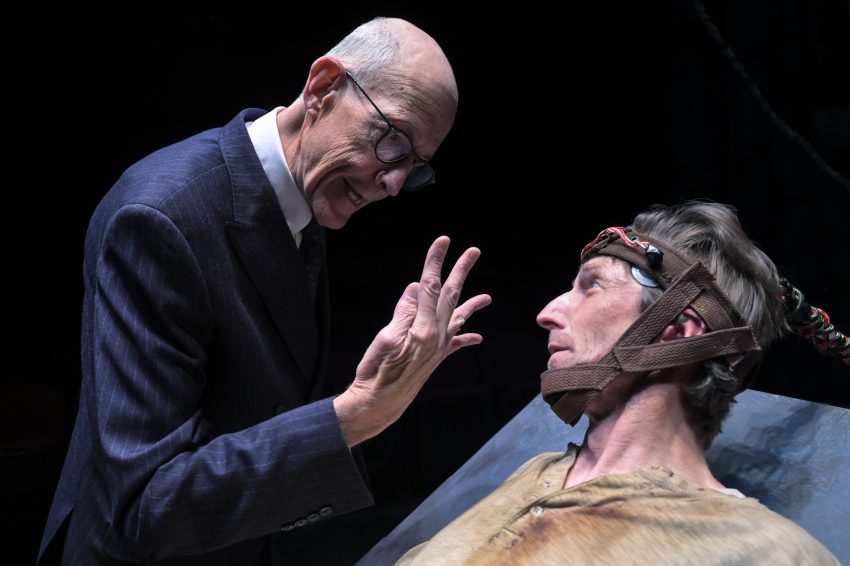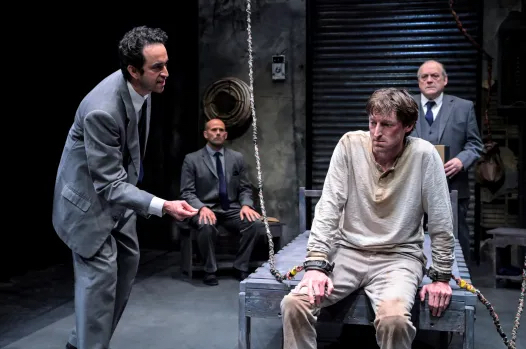
If you’re more interested in holding tight to the things you’re thankful for than in cranking up the amperage of your holiday cheer, the Aurora Theatre’s production of “1984” may be just the ticket for you.
Artistic Director Josh Costello has done a daring bit of counterprogramming in staging the dark, tarnished, distinctly tinsel-free vision of George Orwell—as adapted by local playwright Michael Gene Sullivan—at this particular time of year.
To lean into unwavering grimness rather than meltaway Grinchness is a risky gamble in spend-and-celebrate season; a bet that there’s some slim, indignant audience segment that would opt to watch Tiny Tim limp off into the gutter because it’s just more real and righteous than even briefly setting Humbug aside for Ho-Ho-Ho.
This show is bleak, dude.
Even bleaker, perhaps, that its source material.
Orwell’s 1949 novel of dystopian society was a warning based on glimpses and inklings, a caution against the advent of constant surveillance, fake news and authoritarian rule. The book’s titular year passed two decades ago, but its warnings still go largely unheeded.
In Orwell’s novel, Winston, the protagonist everyman, lives, however meagerly, to greet another dawn. Maybe, somehow, there is more to come for him, for humanity.
Sullivan’s play ends in a blackout of total surrender.
Pa rum pum pum pum.
Conceptual strength
If you set the calendar aside, there are elements to admire in this production.
Scenic designer Jeff Rowlings‘ distressed metal set pieces, all-seeing telescreens, and thick braids of electrical wiring to which Winston (a haunting, gaunt Joseph Patrick O’Malley) is yoked for the bulk of the play suggest a dusty rustpunk futurism in which tomorrow is dead on arrival.

Kurt Landisman’s lighting effectively modulates between glare and drear. Matt Stines’ sound design evokes overworked machinery on the verge of breakdown. The cast’s make-up makes spiritual anemia visible.
And costume designer Maggie Morgan uses the functional shapes and drab grays of business suiting less to establish individual characters than to wrap the whole ensemble in a collective shroud.
This same sense of mass subjugation informs the most creative aspect of Sullivan’s script and Barbara Damashek’s direction: Ensemble members read aloud from Winston’s allegedly traitorous diaries throughout the interrogation and torture sessions that make up to play’s action.
Winston has been accused of “thoughtcrime” (i.e. disagreeing with the fascist Big Brother government). But when we hear the accusers recite his journal entries with surprising passion in their delivery, we sense that rather than natural born villains Winston’s oppressors were once where he is now—and that he’s inexorably headed to join them.
Wrongful confinement
Clever as it is, Sullivan and Damashek’s story theater approach wears thin well before the end of the production’s two-plus hours.
Each player in the Party Member ensemble (David Bryant, Daniel Duque-Estrada, Brady Morales-Woolery, Megan Soledad) deftly etches multiple characters, but one wishes they were able to fully embody these roles rather than present them through narration.
The play feels locked up.
Orwell’s “1984” is foremost a novel of ideas. Its characters aren’t fully three-dimensional. But they move through a series of adventures in treacherous urban landscapes, from narrow alleyways to vast public squares, encountering lovers, collaborators, rogues and enemies.
In the novel’s cinematic sweep, they become more human than they do in this too-prosaic single-celled stage version.
Give the book as a holiday gift—with no pressure to read it until January.
1 Comment
-
Daniel Dallabrida
on November 26, 2023Great review, Jim. Wonderful writing.
Comments are closed.
